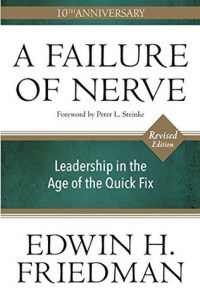
There are few books that literally change the way I view my whole life outside of the Bible, but I have just read one: A Failure of Nerve by Edwin Friedman. Maybe it’s the content, maybe it’s the time in my life during which I came across it, or maybe it’s the point that our culture has reached–this book pinpoints why we see anemic leaders throughout our society. Although Friedman died before he could finish writing this book, it is complete enough to challenge much about what you believe about yourself, your family, and the organization you call “work.”
Friedman’s background allowed him to write the book toward the end of his rich, full life of working with all types of people from the President of our nation, to congressmen, to Fortune 100 company presidents, to pastors and rabbis as well as parents and children. His work taught him that if you can’t have a healthy relationship in the home you are not going to have them in the church or on the job. We are all called to be leaders in our homes, our churches and in our society. He believes that it is the same principles at work in one venue as another. This flies in the face of current beliefs and is especially relevant today as leader after a respected leader allows personal immorality to cloud professional credibility.
Additionally, in our current culture (and most homes) a system has developed which inhibits good leadership and will literally rebel against a good leader should she or he decide to step up and drive change. Only truly self-differentiated leaders will be able to lead in these emotionally regressive cultures, and even then, some have a failure of nerve and pull back.
Friedman was a student of history. He saw many parallels in our current leadership culture to those faced in the Dark Ages. He posits that the type of leadership needed to bring us through our anxiety-ridden and leadership fearing current culture was exactly the same leadership needed to bring the world out of the Dark Ages. He sees many similarities between the emotional anxiety that kept the world in the dark and what is keeping our world from making progress toward health.
At the time of his death, Friedman identified an emotional cultural trend in which leadership becomes more and more anxious and afraid to attempt what is necessary to improve the health of the nation. For instance, we are more concerned about showing empathy to emotionally dysfunctional people than we are to helping them improve their pathology. We, therefore, refuse to require responsibility of people. We dumb down our organizations to accommodate the lowest common denominator or the most dysfunctional person.
If someone desires to lead in a healthy manner they will often find followers sabotaging them in a manner that emasculates the leader. This is where the title of the book originates; under this pressure, most leaders suffer “a failure of nerve” and capitulate to the sickest member of the organization due to fear. There are real fears of lawsuits, lack of promotions or accusations of being insensitive, arrogant or simply uncaring. Friedman admits that to lead as needed today, one will not be politically correct. So, if a leader’s desire is to have a sick society applaud his or her efforts, they will never be able to lead effectively.
Friedman’s historical analysis shows that this current condition is very similar to the culture that Columbus faced during the late 15th Century. At that time, the Greeks had known the earth was round for more than 2,000 years, but leaders were still unwilling to stake their fortunes and very lives on it for fear of persecution and ridicule. It was Columbus who was willing to be called a fool and sail in the face of the contrary opinion. Had Columbus (among others) not been willing to demonstrate self-regulated leadership, Friedman was convinced that the Dark Ages would have continued for potentially centuries longer.
Friedman elaborates upon five characteristics that Columbus and other world explorers possessed that led to an entirely new civilization in the New World. What we inherited here in America as far as our view of leadership is a direct result of the foundation laid by those explorers starting with Columbus and continuing on through the establishment of our nation, as we know it today. It is these same five factors that must be demonstrated by leaders in any socio-emotional system that needs a renaissance.
The five characteristics are:
1. A capacity to get outside the emotional climate of the day.
There is so much written today about vision. But for Friedman, vision is not a cerebral exercise. The ability to see things that don’t exist now generally is an emotional phenomenon. It requires you to be emotionally free enough to not conform to existing patterns of knowing and relating and breaking free of others’ expectations. It is knowing where you as a leader begin and end and knowing the same with everyone else in your life. This is emotional, not cognitive! Very few leaders have the emotional resilience to get outside of their current climate.
2. A willingness to be exposed and vulnerable.
As long as a leader is afraid of criticism or failing in front of others they will never be able to lead others out a state of anxiety. When a leader must take total responsibility for their own response to their environment they are very exposed. There must not be a fear of standing where no one else will stand with them; this is where true leadership begins. So many leaders will lead until they are left exposed and alone, and then they have a failure of nerve.
3. Persistence in the face of resistance and downright rejection.
To lead in a new direction (out of the state of anxious culture) requires the kind of drive and motivation that appears to others to be out of balance. In this usage, “balance” is an epithet for the unwillingness to take the risk of stopping the emotional entropy that keeps the culture slipping into the quicksand of anxiety.
As Friedman states
…no one has gone from slavery to freedom with the slaveholders cheering them on, nor contributed significantly to the evolution of our species by working a 40-hour week, nor achieved any significant accomplishment by taking refuge in cynicism.” The resistance not only comes from the outside, it often comes from inside the leader as thoughts like “How can you have it right and everyone else be crazy?
4. Stamina in the face of sabotage along the way.
The key here is that there will be saboteurs who seek to undermine the efforts of the leader. Most leaders are aware and prepared for this. However, often this becomes an impediment when those who start out on the same team with the same passion and ownership of the vision as the leader eventually lose their nerve and mutiny. For every 10 leaders that can handle sabotage from enemies, only one will survive the sabotage of a friend or teammate without experiencing a failure of nerve.
5. Being headstrong and ruthless at least in the eyes of others.
Each of the explorers in the new world did not allow their relationships get in the way of the vision to which they were consumed. Friedman points out that these leaders did not manipulate or use others, but they were very clear in the priority in vision over relationship. In other words, when forced to choose between maintaining a relationship or completing the vision, each explorer stayed with his or her goals. They didn’t rationalize not accomplishing their goals for the sake of “team-building” or “not leaving anyone behind.”
Friedman gives an example from the life of Columbus, which personifies all five of these qualities. On the way to the Canaries, the Pinta’s rudder broke and the crew struggled to fix it. After waiting several days, Columbus felt that this whole incident was an attempt to sabotage his efforts. He sensed his colleagues’ will waning. He finally signaled that he was going on to the Canaries by himself and would wait for them there. He was prepared to go on alone, yet two days later, the Pinta arrived. Columbus was so focused on his goal that whether or not the ships could make a return trip was an afterthought. The objective was reaching his destination, no matter what.
Leadership is never easy and it is never finished. It is like a muscle that requires continual exercise to remain strong. My hope is to see more leaders who are willing to develop, maintain, and use this kind of strength to improve themselves and their organizations.
